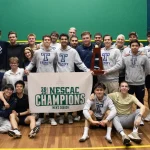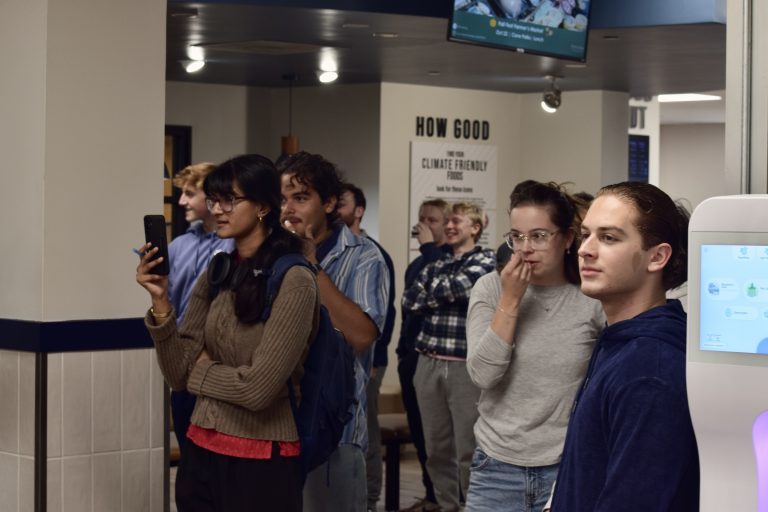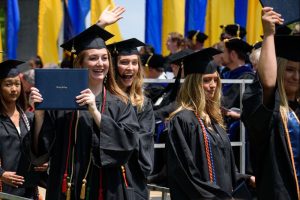Brendan W. Clark ’21
Editor-in-Chief
Chair of the Board of Trustees Cornelia Thornburgh ’80 spoke with the Tripod about the Board of Trustee’s April meeting, the Board’s creation of a President’s Commission for Trinity’s Future, and how the Trustees are approaching Trinity’s finances during the coronavirus crisis.
Thornburgh, in an email to faculty, students, and staff on Monday, indicated that the Commission would be charged with “assessing pressures in the external environment and developing a new architecture to ensure Trinity’s success as a distinctive and excellent liberal arts college.”
In her Wednesday interview, Thornburgh stressed that the Commission “was not an operational committee, but a think tank” and underscored her comments with the fact that the Commission “has a sunset in the fall.” It was created “in an unprecedented time” and to respond to “unprecedented issues,” she indicated.
The Commission was announced without the knowledge of faculty governance officers. The Tripod spoke with Faculty Secretary Mark Stater Tuesday evening, who indicated that “Faculty Conference was not informed of the Commission’s creation,” nor were they “consulted on the selection of faculty to serve on it.” When asked about why faculty and student governance members were not included in the Commission’s composition and why positions on the Commission were unelected, Thornburgh indicated that this was a “select commission,” adding that we have “had them before,” including when the Board of Trustees “considered social issues on campus.”
Thornburgh was asked if she saw the need for the Commission to reconsider having a direct meeting with faculty governance bodies. She responded, “I don’t think so,” adding that “the Commission has a broad mandate, they’ll reach out, and I think they’ll be receptive.”
She added that, in the Commission, we saw “an opportunity to take a very small group to focus on larger issues so we don’t lose sight of our future.” “We are simply asking some bright minds of the college to create an architecture as we look toward the future,” she continued.
When asked about future work of the Commission, Thornburgh noted that there are going to be “more and more opportunities through our existing governance groups, which includes Faculty Conference, PBC, and the Curriculum Committee, to continue to discuss the many issues before us.” Thornburgh added that the Commission’s work will not parallel the work of other committees, stating that “there is absolutely no overlap.”
The Tripod also asked Thornburgh if she was aware of the multi-constituent faculty committee, proposed by Faculty Conference at the Apr. 14 faculty meeting. Thornburgh indicated that she “had heard they were considering some sort of new committee.” “We can create a lot of committees,” Thornburgh continued, but it “seems to me that we have a pretty strong governance structure in place now.” At the Board level, she added, “I feel pretty comfortable that we don’t need to revise our committee structure.”
“The faculty may think otherwise,” Thornburgh stressed. “I don’t presume to speak for them.”
Thornburgh emphasized that the Commission will “not interfere with the governance structures in place at the college.” When asked about the Commission’s charge and inclusivity, Thornburgh stated that the Commission will “not supplant voices” of other constituents at the college. “I’ll remind you, the Commission is not a committee,” she added.
Rather than address the short-term, Thornburgh stressed, the Commission will focus on long-term objectives. Thornburgh added that “our future is not what happens in the fall, it is what happens in two, five, ten years out.” She continued that this planning is “really the purview of the trustees,” as operational decisions are under the ambit of “our very capable president and our very capable faculty.” Thornburgh praised the faculty, citing their ability to “adapt quickly” to the uncertainty the pandemic has produced.
Thornburgh indicated that the Commission was “purposefully very small, very nimble” and that it is intended to be a “launching pad for future conversations and will create an architecture for future conversations.” When asked if Faculty Conference or other governance groups among faculty and students would be able to submit feedback or statements to the Commission, Thornburgh stated that while she “doesn’t want to speak for the Commission Chair, Trustee Lisa Bisaccia ’78, she is sure the Commission will be receptive to reaching out moving forward.”
When asked about the make-up of the Commission, Thornburgh added that non-trustee alumni were not included, in part, because “if we included representatives of all constituents, we would be well over 30 people.” She added that we “took those closest to Trinity to launch its work,” which she stressed will be “a start, not a finish.”
Speaking about the pandemic’s impact on Trinity and the College’s Endowment, Thornburgh added that, following the Board of Trustees meeting this weekend, there will be a “town hall in the coming weeks where we would like to discuss the Endowment.”
While acknowledging significant Endowment losses in this quarter, she added that “we do not view the Endowment as a rainy-day fund…none of higher education does.” When asked about the possibility of salary cuts for faculty and staff, or if drawing on the Endowment would come first, she added that “everything is on the table. There have been no definitive decisions.”
On tuition, Thornburgh indicated that it “really depends if we’re on-site or not.” She stated that the Board is “planning a lot of different scenarios,” adding that it is “too premature to say what we will do at this point.”
Despite the pandemic, Thornburgh identified a “silver lining,” adding that “students are learning online skills” and “faculty are taking charge” and she “gives them a lot of credit.”
When asked about Admissions and especially the future of international students,” Thornburgh added that “clearly we’re going to support our students however they need to going forward.” Citing her involvement with founding the International House, she added that “she loves the perspective international students bring to the College” and added that to “not have them with us, physically, during this time is very sad.”
“I don’t have a crystal ball,” Thornburgh continued, though she added that she hopes for more clarity in the future at the state and federal level. She added that the State of Connecticut is “committed to assisting higher education institutions” with these decisions.
On the College’s Comprehensive Campaign and whether its expectations will be lowered, Thornburgh added that “we’re pausing the campaign.” She also cited a “pause on capital projects,” as “clearly the students have to come first.”
All of our advancement work is focused on “supporting the students,” she said. With that said, she pointed toward an announcement about some “pretty nice donations to support the students.” She added that that announcement will be coming “soon.”
Speaking on the status of graduate programs and Trinity’s satellite locations downtown, she added that “we have a strategic plan and we want to follow that plan.” “We have a hiccup here,” it is just a “question of when we can get ramped up again,” Thornburgh stated.
We will “have to adapt to some shifting ground,” she added.
Thornburgh noted that students have “reached out” and she is “very encouraged by what she hears from students.” While it is really “sad for our seniors,” Thornburgh stressed that the Board will look to support their Commencement next year. They “remain loyal Bantams,” Thornburgh remarked, adding that she “feels inspired by the students who, clearly, are not going to let the virus get them down.”










+ There are no comments
Add yours